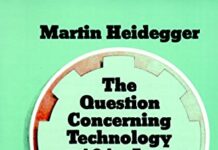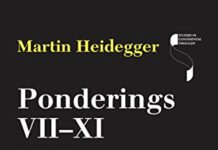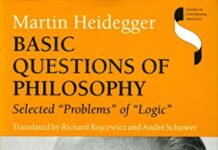
Ebook Info
- Published: 2013
- Number of pages: 271 pages
- Format: PDF
- File Size: 8.78 MB
- Authors: Martin Heidegger
Description
The Essence of Truth is an examination of the most fundamental theme in Heidegger’s philosophy: the difference between truth as ‘the unhiddenness of beings’ and truth as ‘the correctness of propositions’. Based on a course of lectures delivered at the University of Freiburg in 1932, the book presents Heidegger’s original analysis of Plato’s philosophy and represents an important discussion of a fundamental subject of philosophy through the ages.
User’s Reviews
Reviews from Amazon users which were colected at the time this book was published on the website:
⭐Well this is quite something. The late Martin Heidegger (d. 1976) is probably the most influentialphilosopher of the last century. Plato is, well, Plato. Here a great thinker teaches about an evengreater one, and the topic is no less than the essence of truth. With all the advances of modernscience, philosophy in the modern world can be absorbed into scientism, and lose the mostfundamental questions to ask, namely the question of being. And for Heidegger, truth is not anabstract proposition but is about being in history, being there, and the liberation that comes withencountering being. He assures the reader, it’s not about how much you know but whether youare asking the right questions.To explore the essence of truth and being, Heidegger looks at Plato’s most famous passage, theallegory of the cave from the Politeia (Republic). Truth, aletheia, is unveiling, uncovering, somewhatdifferent from the connotation of veritas in Latin and following. Untruth, pseudos, is explored inPlato’s Theaetetus. Pseudos doxa is false view, false opinion. It is related to the notions ofepisteme, aesthesis, phantasia, and several others.It’s important to remember that even if he is unveiling or retrieving important aspects of Plato,Heidegger’s Plato is just Heidegger’s Plato. There are also Leo Strauss, Eric Voegelin, Plotinus,St. Augustine, etc. Heidegger is a genius and a powerful rhetorician, like the great philologistFriedrich Nietzsche. But while Nietzsche attacked Socrates as the cause of many problems,Heidegger engages Plato’s Socrates. Plato certainly developed beyond Socrates. But it’s hardfor me to believe that he placed words on the lips of the teacher that would be antithetical tothe spirit of his thought.My Greek is weaker than my Latin, because I only had part of a semester. So I had to review thealphabet. The lengthy passages from the Republic and Theaetetus are translated into German(by Friedrich Schleiermacher) and English. What a linguistic feast! But the key terms are left inGreek. Here are a few.episteme (knowledge), logos (word, speech), aesthesis (perceiving, perception, etc), ousia (being,nature), agathon (good), legein (say, gather), eidos (look), episkopein (look upon), doxa (view, opinion)eros (desire, striving), nous (reason), on (being, thing), sullogismos (syllogism, process of reasoning),telos (end, goal), paedeia (education, positionedness), phantasia (what appears) phusis (nature),pseudos doxa (false view or false opinion), psuche (soul)p. 46 Heidegger tackles Hegel’s (and Aristotle’s) question of the relationship between art and philosophy.The essence of art is not the expression of any ‘lived experience’ (Erlebnis), and does not consist in anartist expressing his ‘soul-life’ such that, as Spengler thinks, later ages have to inquire about how artreflects the cultural soul of an historical period. Neither does it consist in the artist depicting realitymore accurately and more precisely, or producing something that gives pleasure to others, enjoymentof a higher or lower type. Rather, the artist possesses essential insight for the possible, for bringing outthe inner possibilities of beings, thus for making man see what it really is with which he so blindlybusies himself. What is essential in the discovery of reality happened and happens not through science,but through primordial philosophy, as well as through great poetry and its projections (Homer, Virgil,Dante, Shakespeare, Goethe). Poetry makes beings more beingful. Poetry, not just any old writing!But in order to understand what the work of art and poetry as such are, the philosopher must firstcease to think of the problem of art in aesthetic terms.p. 231 gives a glimpse into Heidegger’s power as a philosopher of being in history.What does ‘idea’ mean? With this question we touch on the foundation and fundamental constitutionof Western spiritual Dasein. For it was with the assistance of the Platonic doctrine of ideas that theChristian concept of God was unfolded, and thus the standard established for the governing conceptionof all other (non-divine) beings. The modern concept of reason, the age of Enlightenment and rule ofrationality, thus also the movements of German Classicism and Romanticism, all unfolded with the helpof the doctrine of ideas. The synthesis of these two forces, completed in Hegel, is the Christian completionof the Platonism of antiquity and a counter-thrust with the latter’s own ideology and the whole systemof Marx and Marxism. But also, in another direction, Kierkegaard; the watering down, mixing together, anddomestication of all these powers of the nineteenth and early twentieth centuries. At the end of thenineteenth century Nietzsche against the three fronts of Humanity, Christianity and Enlightenment.There has since been no clear, no primordial, no decisive, and no creative, spiritual, historical standpointand stance of man.
⭐Being as clarification (unhiddenness) v. correctness (propositional validity). 3. Beholding the Ideal contained in flux.As far as throwing light upon “Being”, Heidegger’s ‘clearing’ consists only in the aperture of the cornea that isformed around the iris: it does not go deeper into ‘it’. Heidegger’s idea of leaving the cave consists in facingthe light and seeing what is ‘nakedly’. This might be adequate if what occurs in the eye is not mere sense, butalso the faculty of judgement; the case is that sense impressions are subject to judgement (interpretation, ifyou like) prior to their becoming SUBJECT to our awareness. That is, ‘direct consciousness’ of objects ismediated by the understanding, and it is a misnomer to speak of consciousness as being ‘direct’ in any SENSEwhatsoever. As for the Will, Being is only directly conceived through [carpe diem] it in the process ofbecoming [panta rei] precisely WHEN one surrenders the status of compos mentis as a ‘true’ entity for thatwhich makes for a greater awareness through intuition (i.e. knowing, and not a greater ‘proximity’ to Beingwhich in any case would be only another state achieved and not a ‘field of vision’ gained). This expresses the paradoxical nature of truth, of Dasein as Werdens; as neither Being nor Nothing. The concept of truth asunhiddenness of Dasein remains problematic given its visual nature, which is in no way adequate a model ofthe understanding, or even Will to remain tenable: unhiddenness is not disclosure, and if the error wasone of judgement in the first place it is not a question of sight which unveils, but insight that discloses the ‘nature’ of things-in-themselves (Beings, if you will) as they are, from which we can reason back anddistill what we receive first as sense datum, to the pure Idea which is beholden to us (it as necessary and dearto us, as we to it).
⭐Good book. It is what I expected.
⭐Arrived in excellent condition.
⭐Heidegger for those not ready for Being and Time.
⭐Purchased as a gift. All arrived on time and as described. Good introduction to an interesting area of study.
Keywords
Free Download The Essence of Truth: On Plato’s Cave Allegory and Theaetetus (Bloomsbury Revelations) in PDF format
The Essence of Truth: On Plato’s Cave Allegory and Theaetetus (Bloomsbury Revelations) PDF Free Download
Download The Essence of Truth: On Plato’s Cave Allegory and Theaetetus (Bloomsbury Revelations) 2013 PDF Free
The Essence of Truth: On Plato’s Cave Allegory and Theaetetus (Bloomsbury Revelations) 2013 PDF Free Download
Download The Essence of Truth: On Plato’s Cave Allegory and Theaetetus (Bloomsbury Revelations) PDF
Free Download Ebook The Essence of Truth: On Plato’s Cave Allegory and Theaetetus (Bloomsbury Revelations)




